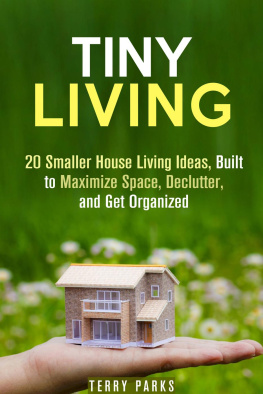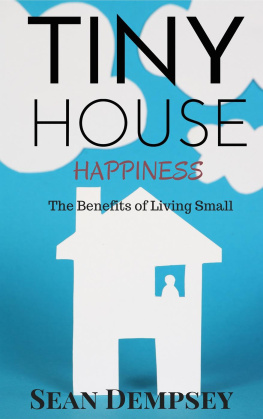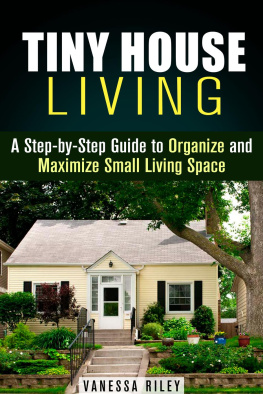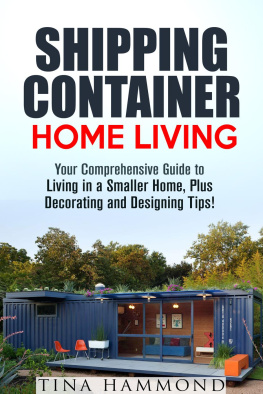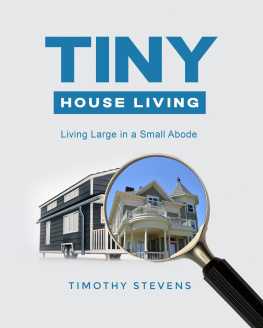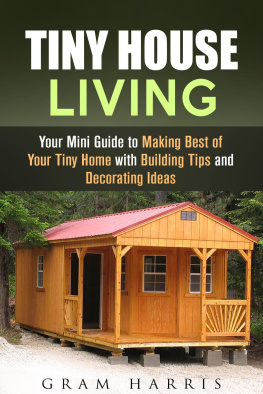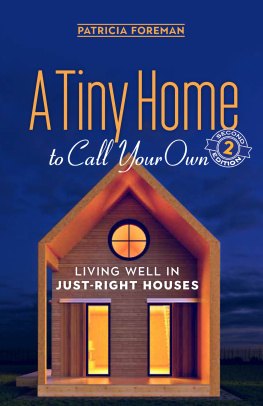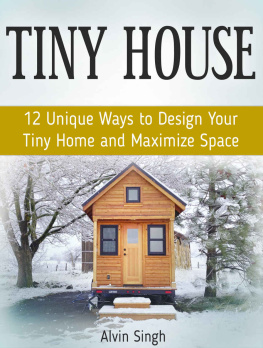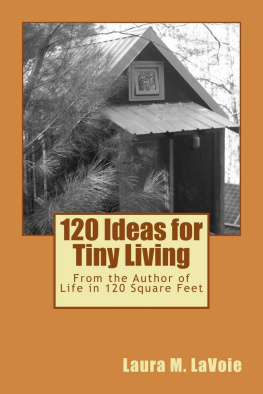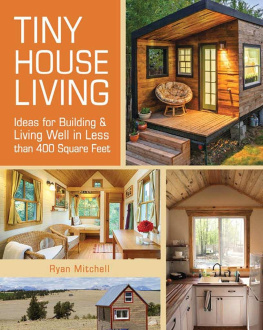Tiny Living
20 Smaller House Living Ideas, Built to Maximize Space, Declutter, and Get Organized
Copyright Notice
Reproduction, duplication, transmission of this document in part or in whole is permitted only with written permission from the publisher. All rights reserved.
Respective brands and trademarks mentioned in this book belong to their respective owners.
Disclaimer
This document is geared towards providing summarization of information related to the topic. While all attempts have been made to verify the accuracy of the information, the author does not assume any responsibility for errors, omissions, or interpretations of the content. The information is offered for informational or entertainment purposes only. If professional advice is necessary, a qualified legal, medical, financial or another respective professional should be consulted. The reader is responsible for his or her own actions. The publisher does not accept any responsibility or liability arising from damages or losses, real or perceived, direct or indirect, resulting from the use of this information.
Table of Contents
Introduction
S o now the time has come, to think large thoughts about living small. With the increasing emphasis on buying bulk, self-storage, and the ancient art of keeping up with the Joneses, now we have come full circle, to the concept of austerity, the economy, and intimacy. Join us in this adventure, by reading in this book not only the philosophical reasons for a smaller, less grandiose style of living, but also advice on strategies and ideas that will make the down-sizing that much easier to accomplish.
Whether your current life is too expensive to maintain, you fear your tendency to buy and hoard, or if you simply want to consider traveling with a portable home, we believe this book will provide you just what you need to keep on your new course and achieve your goals. In its pages you will discover the benefits of multi-tasking furniture, the pro and con positions concerning having running water in your new, tinier dwelling, and whether or not your home could be portable from the start.
The wonder of life in the modern world is the amenities, tools, and utilities one can take advantage of, and the true freedom that can come from living off the grid. Even if you find you are not ready for the full-time transition, reading about the possibilities will at least open your mind to possibilities, that can at the least help you live nearer your means, and to live a life unfettered by the oversized, upgraded, and opulent life that Marketing Managers around the world would have you choose.
So enjoy this book, and Lets get SMALL!, as Steve Martin used to say.
Chapter 1: A Tiny Home is a Tidy Home
I f you are reading this, you are already fascinated by the concepts of reduction, miniaturization, and getting into smaller living. This doesnt mean skimping; if you are seven feet tall, by all means, you may have a bed over seven feet in length. What we are referring to is a life that embraces the opposite of opulence; it is an embrace of austerity, a recognition of the real. Much of the worlds message is MORE; choosing instead to live with less, literally of every category of material possession is a lesson in liberty, freedom from stuff. And a primary benefit of such a simple life is a level of tidiness, of order, that most of us have only dreamed we might achieve.
Also, note that these truths will be applicable, even if you have a larger space. So if you are seeking a solution to your growing collection of clutter, plutter, and lovable junk, take the following tips to heart, and soon you will find your way free from it all.
In this chapter, you will learn:
- Clutter is a derivative of space
- Keys to keeping clutter under control.
The Gateway to Creating Clutter is KEEPING Things.
D id you ever discover an interesting piece of plastic packaging with a purchase, and think to yourself, Man, that is kinda cool. I will probably think of something I can make with that someday? Or purchase a power tool that came with an oversized cardboard container and think, I am certainly going to hold onto this box, in case I ever move from this house, because it is perfect for packing it back up when that happens?
I sure have, and Im sure you have had similar thoughts about material things. There is something magical about objects made by human ingenuity; even if we dont have a particular use for it, the very concept that someone went to the effort to create it engenders a certain respect.
The truth is, however, that we are by nature collectors. Some of us are very aware of that tendency, and we take great care of our collection, our choice of thinks to keep. But there is a very narrow line between collection and clutter.
So it is with a Tiny Home Lifestyle. Welcome to a well-ordered life.
Finite Space Means Finite Stuff.
The choice to live in a world where opposing walls could feasibly touched at the same time automatically will limit what you own. In a later section, we will talk about the basic Laws of Living Light, but for now, it is enough to say that your square footage will determine how much furniture you can have, what appliances you can store, how many clothes you can keep on hangers or in drawers. When the material items you have must fit in a reduced space, you simply wont be able to have as many of them. That means there will be less that can be out of place. Doesnt that make sense?
Less Stuff Means Less Out of Place.
If you reduce your flat surfaces to an absolute minimum, you have fewer places to pile unorganized stuff. If you have fewer drawers overall to put things in, there will simply fewer things put in the improper drawer. This is all simply numeric; it isnt rocket science. Knowing that, and making the effort to do the absolute most with your absolute least can free up a lot of mental energies, as well as create a positive sense of accomplishment when each objective is accomplished. So a constant process of removing stuff actively from your equation is critical to your success.
Three Tips to Tidiness:
I t is an old adage that cleanliness is next to Godliness. Most of us are not set on being like God, or even accepting His (or Her) existence, but we do like to think positively about having a heavenly living experience. So it is with keeping our space clutter-free and clean.
As an example, lets talk about this process in terms of brass tacks, the real deal. Go find an object in your house, perhaps in this very room, that is clearly out of place, not put away (this book, obviously, doesnt count!)
Apply these three tips to determine the proper situation for its dispensation.
Is this your property, or that of another?
This might be a tougher situation than you might think. Maybe you borrowed it from someone. Maybe its from the library. Perhaps you have already read it and have been just keeping it as a memento of that time.
Whether it is just temporarily out of its rightful place or if it is actually the property of someone else is critical to tidiness. Being brutally honest with yourself will help immensely, because often our lives are so intertwine with others that we tend to dismiss or discount ownership, and thus we tend to disrespect, or at least ignore things that are out of place, even if subconsciously, on the basis that it is not our responsibility.
So the first tip to tidiness: Acknowledge Ownership, or Get it Back to its Owners care. Knowing and taking responsibility is the first step to just about anything.
Does this item have a permanent residence?
If you have a regular purpose and use of an item, it should have a singular location where it is kept. This is even more important when space is limited. For simplicity, choose this permanent location near where the item is used (hairbrush adjacent to the mirror, for example) for ease of recovery, and to make the habit of returning it to its proper place easier to accomplish.
Next page
